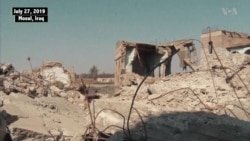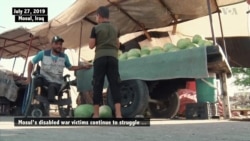Amid the bombed-out wreckage of a site that once hosted dozens of Mosul’s traditional maqam players, Iraqi musician Saad Rajab Bacha plays his ney flute to remember the city’s glorious days before it came under the control of Islamic State (IS).
WATCH: Iraqi Musician Returns to Ruined ‘Maqam House' in Mosul
Bacha, 65, fled Mosul in June 2014 after IS fighters overran the city and established a hard-line rule that deemed all musical instruments, including his ney, a violation of Islamic law.
When he returned home two years later, he found that much of his beloved city had been reduced to rubble in the Iraqi fight against IS.
The sad melodies that emerge from his ney come as Iraq this month celebrates the second anniversary of recapturing the city from IS.
City in ruins
Bacha says that despite the initial optimism for a new life after the jihadists’ defeat, much of the city still lies in ruins and its artists, among thousands of residents, are unable to return because of lack of essential services.
“I feel like art has been slayed,” Bacha told VOA, adding that Mosul’s artists were either killed or had to flee because of charges of blasphemy by IS.
“The effort of artists in Mosul has been lost due to those extremists who hate life, music and art,” he added.
Bacha now resides in the Iraqi Kurdistan Region’s capital, Irbil, but frequently visits his hometown, Mosul, to help arrange musical events in the city. He has been playing the Iraqi-style ney flute for more than 30 years, establishing a name among Mosul residents for his contribution to Iraqi traditional maqam music.
Before IS attacked the city and banned music from its residents, Bacha helped organize musical events at Maqam House, which was built 25 years ago in western Mosul’s district known as the Old City.
“This place is now a big wound in my heart,” Bacha told VOA, sitting by the remnants of Maqam House, which was destroyed by an airstrike in 2017. “A few years ago we were all present here, working together, enjoying our times, and playing together. Now this is all a mere memory.”
Mosul is Iraq’s second-largest city with a population of more than 1 million that stayed in IS's grip for three years. Then-Iraqi Prime Minister Haider al-Abadi officially declared victory in the city in July 2017.
The jihadist group has since lost control of all territories it once ruled as part of its self-proclaimed caliphate in Iraq and eastern Syria.
The road ahead
Following the IS defeat, the U.N. warned that the road ahead was “extremely challenging” because of the degree of destruction the war left behind. It estimated that more than $700 million was needed to stabilize the city and make it livable again.
Two years after the military operation, local and international organizations say large parts of the city remain unrecovered, particularly in the western part of the city where fierce fighting between IS and Iraqi forces took place.
According to the Norwegian Refugee Council, more than 300,000 residents of the city are still displaced with no homes to return to. The organization found that 138,000 houses were damaged or destroyed during the conflict. In West Mosul alone, it estimated that there are still more than 53,000 houses flattened and thousands more damaged.
“For them, the suffering of the war that ended two years ago remains a daily battle for survival,” Rishana Haniffa, the Iraq country director for the Norwegian Refugee Council, said on the anniversary of Mosul’s recapture this month.
“It’s a disgrace that after two years, thousands of families and children still have to live in displacement camps and in abysmal conditions because their neighborhoods are still in ruins,” Haniffa added.
Bodies under rubble
People who have returned to the city say many bodies of civilians and IS militants who were killed in the battle still remain under the rubble of the Old City.
WATCH: Residents Disabled by IS Are Mosul’s Most Vulnerable
Residents who were interviewed by VOA expressed disappointment at the government's failure to rebuild the destroyed infrastructure and compensate the victims, particularly those who were incapacitated by the conflict.
Raad Ahmed is one of the victims who lost both his feet during clashes between Iraqi forces and IS. Having also lost his younger brother in the war, Ahmed needs to work as a vegetable seller to provide bread for his family as well as his brother’s.
“I went to the disabled office and asked them to give me a wheelchair because I work. The manager of the office told me, ‘You don’t deserve it,’ ” Ahmed told VOA, adding that the money he made as a vendor was not enough to provide for his family and obtain his special needs.
He asked rhetorically, “If I don’t deserve this basic right, then what do I deserve? What do we deserve from this country? All we have gained from it is pain, the destruction of homes, and the death of our youth."
Iraqi officials have publicly announced that recovering from damage caused by IS in the war is beyond their means and that they need generous international aid to enable them to restore the nation.
An international conference in Kuwait in early 2018 collected about $30 billion, mostly in credit and investments, to help rebuild Iraq's economy and infrastructure. However, that amount fell far short of Iraq’s expectation of $90 billion for post-IS recovery.







